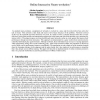Free Online Productivity Tools
i2Speak
i2Symbol
i2OCR
iTex2Img
iWeb2Print
iWeb2Shot
i2Type
iPdf2Split
iPdf2Merge
i2Bopomofo
i2Arabic
i2Style
i2Image
i2PDF
iLatex2Rtf
Sci2ools
NPL
2000
2000
Online Interactive Neuro-evolution
In standard neuro-evolution, a population of networks is evolved in a task, and the network that best solves the task is found. This network is then fixed and used to solve future instances of the problem. Networks evolved in this way do not handle real-time interaction very well. It is hard to evolve a solution ahead of time that can cope effectively with all the possible environments that might arise in the future and with all the possible ways someone may interact with it. This paper proposes evolving feedforward neural networks online to create agents that improve their performance through real-time interaction. This approach is demonstrated in a game world where neural-networkcontrolled individuals play against humans. Through evolution, these individuals learn to react to varying opponents while appropriately taking into account conflicting goals. After initial evaluation offline, the population is allowed to evolve online, and its performance improves considerably. The populati...
Related Content
| Added | 19 Dec 2010 |
| Updated | 19 Dec 2010 |
| Type | Journal |
| Year | 2000 |
| Where | NPL |
| Authors | Adrian K. Agogino, Kenneth O. Stanley, Risto Miikkulainen |
Comments (0)

